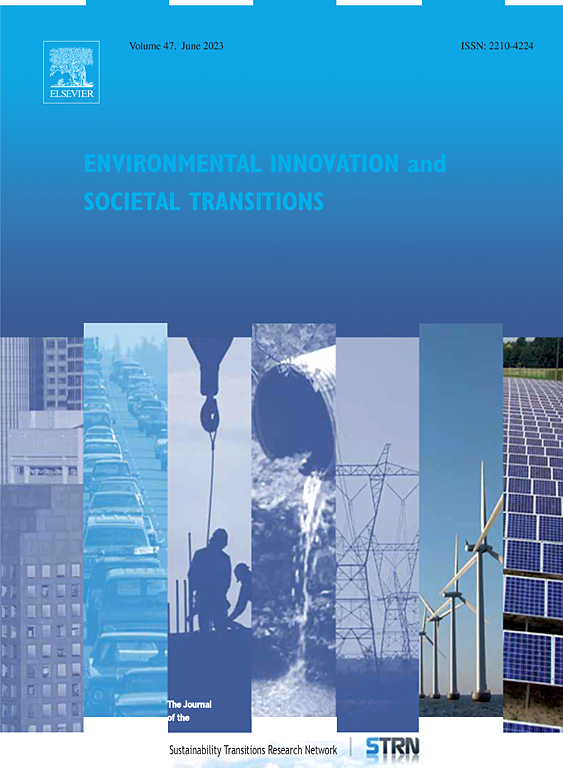Modelling potential environmental and socio-economic impacts of substituting livestock meat with soy-based meat substitutes
IF 6.1
2区 经济学
Q1 ENVIRONMENTAL SCIENCES
Environmental Innovation and Societal Transitions
Pub Date : 2025-05-16
DOI:10.1016/j.eist.2025.101006
引用次数: 0
Abstract
Plant-based meat substitutes are becoming increasingly popular as an alternate protein source. We used input-output analysis to model the environmental and socio-economic impacts of transitioning to soy-based meat substitutes to replace macronutrients lost from reductions in livestock meat consumption. We found that soy-based meat substitutes can be macronutrient replacements for livestock meat with significant environmental benefits mostly in reduced biodiversity loss, land use, and agricultural water consumption. We also found that expansions of soybean cultivation are not necessary for the transition as the decrease in soybeans for animal feed is more than sufficient to meet the increase in soybeans for soy-based meat substitutes. There are small decreases in employment and income in the livestock sector from the transition, but negative socio-economic impacts are less substantial compared to the environmental benefits. Therefore, transitioning to soy-based meat substitutes could mitigate adverse environmental impacts and improve the sustainability of global food systems.
模拟用大豆基肉类替代品替代牲畜肉类的潜在环境和社会经济影响
植物性肉类替代品作为替代蛋白质来源正变得越来越受欢迎。我们使用投入产出分析来模拟向大豆基肉类替代品过渡的环境和社会经济影响,以取代因减少牲畜肉类消费而损失的大量营养素。我们发现以大豆为基础的肉类替代品可以作为家畜肉类的宏量营养素替代品,具有显著的环境效益,主要是在减少生物多样性丧失、土地利用和农业用水方面。我们还发现,大豆种植的扩大对于过渡来说是不必要的,因为动物饲料中大豆的减少足以满足大豆基肉类替代品的增加。畜牧部门的就业和收入因转型而略有减少,但与环境效益相比,负面的社会经济影响并不大。因此,过渡到以大豆为基础的肉类替代品可以减轻对环境的不利影响,提高全球粮食系统的可持续性。
本文章由计算机程序翻译,如有差异,请以英文原文为准。
求助全文
约1分钟内获得全文
求助全文
来源期刊

Environmental Innovation and Societal Transitions
Energy-Renewable Energy, Sustainability and the Environment
CiteScore
13.60
自引率
19.40%
发文量
90
审稿时长
56 days
期刊介绍:
Environmental Innovation and Societal Transitions serves as a platform for reporting studies on innovations and socio-economic transitions aimed at fostering an environmentally sustainable economy, thereby addressing structural resource scarcity and environmental challenges, particularly those associated with fossil energy use and climate change. The journal focuses on various forms of innovation, including technological, organizational, economic, institutional, and political, as well as economy-wide and sectoral changes in areas such as energy, transport, agriculture, and water management. It endeavors to tackle complex questions concerning social, economic, behavioral-psychological, and political barriers and opportunities, along with their intricate interactions. With a multidisciplinary approach and methodological openness, the journal welcomes contributions from a wide array of disciplines within the social, environmental, and innovation sciences.
 求助内容:
求助内容: 应助结果提醒方式:
应助结果提醒方式:


